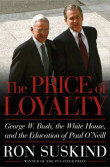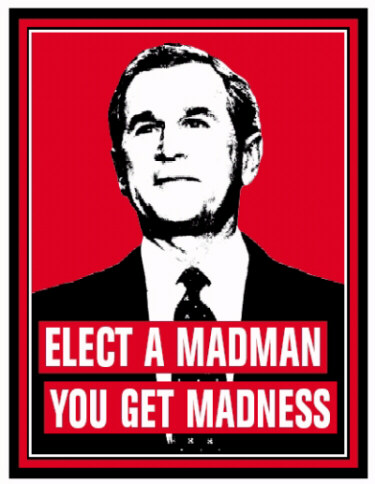Ignorance as Ideology

 Ron Suskind,
Ron Suskind,The Price of Loyalty: George W. Bush, the White House, and the Education of Paul O'Neill
Simon & Schuster, 2004
David Cay Johnston,
Perfectly Legal: The Covert Campaign to Rig Our Tax System to Benefit the Super Rich - and Cheat Everybody Else
Portfolio, 2003
The negative reaction on the Left to Ralph Nader's recently-announced presidential candidacy has shown that the general attitude among U.S progressives today really is "Anyone But Bush." This is a sort of pragmatist war cry, and a huge distance from 2000's bitterly sarcastic description of the Republicans and Democrats as "Tweedledum and Tweedledee."
"Anyone But Bush" is a good sign. This is the kind of solidarity that right-wingers have mustered behind their candidates for decades. Notwithstanding vast differences between the Religious Right and moderate fiscal conservatives, neo-libertarians and moral interventionists, the Republican Party's most important mantra since Reagan has been "Don't criticize other Republicans." The Left, on the other hand, has a storied history of splinter groups and infighting, and in 2000 this manifested with disastrous results. Now, at long last, it seems like people with political and social views far to the left of John Kerry are indicating a willingness to hold their noses and vote for the man (or for Edwards, if by some unlikely turn of events he should be the nominee) if it will spare a significant amount of human suffering and perhaps slow the environmental decay of the planet.
The Clinton years saw the rise of the global justice movement with huge protests against international financial institutions in Seattle and Washington, D.C. This was the most radical non-identity-based movement the U.S. had seen in many years, as labor, environmental, and anti-capitalist groups came together to critique the very operation of the global economy itself. This critique included harsh criticism of Clinton as the manager of a kind of global empire of free-trade networks and military pressure, and Gore was seen as merely a successor-manager, the next CEO of a ravenous, heartless corporation. This movement, many of whose members supported Ralph Nader in 2000, was sidelined not only by the stolen election of 2000 but even more significantly by 9/11, as many of its members felt forced to turn from issues of corporate globalization and instead to pursue worldwide efforts to stop Bush's wars. The anti-globalization movement also lost much of its ability to paint American/transnational industry as the villain, as a far starker example of villainy took center stage (and, embarrassingly, also had globalization in its sights). Today, visible figures of the global justice movement, like Global Exchange's Medea Benjamin, who was also a Green Party candidate for Senate from California in 2000, are openly speaking about the need to vote for the Democratic candidate in 2004-whoever it is.
 What, exactly, has George W. Bush done to unite the Left in this way? The consensus
seems to be that the Bush presidency has been so destructive that the old argument
that "the parties are the same" has lost its force. Indeed, Bush has been surprisingly
awful. He ran as a centrist in 2000, promising a program of "compassionate conservatism."
At that time, he was largely mocked by Leftists as a stupid man with a record of
failure in life and a poor command of the English language. Today, no one is
laughing. His presidency has relentlessly pursued policies that enrich the
already-rich, impoverish the already-poor, damage the environment,
undermine international law, and weaken the Bill of Rights. [See related articles] He has attacked two countries, killing thousands in military operations whose effect on our national security remains unclear, and he has done extreme damage to the image of the United States abroad. Bush's policies appear to be uniquely terrible. Democrats are clamoring for a return to the Clinton Golden Age. Greens and other progressives to the left of Democrats just want it to stop.
What, exactly, has George W. Bush done to unite the Left in this way? The consensus
seems to be that the Bush presidency has been so destructive that the old argument
that "the parties are the same" has lost its force. Indeed, Bush has been surprisingly
awful. He ran as a centrist in 2000, promising a program of "compassionate conservatism."
At that time, he was largely mocked by Leftists as a stupid man with a record of
failure in life and a poor command of the English language. Today, no one is
laughing. His presidency has relentlessly pursued policies that enrich the
already-rich, impoverish the already-poor, damage the environment,
undermine international law, and weaken the Bill of Rights. [See related articles] He has attacked two countries, killing thousands in military operations whose effect on our national security remains unclear, and he has done extreme damage to the image of the United States abroad. Bush's policies appear to be uniquely terrible. Democrats are clamoring for a return to the Clinton Golden Age. Greens and other progressives to the left of Democrats just want it to stop.
What's more, the Left seems uniquely fixated on, and opposed to, Bush as an individual. The Left, especially those progressives who tend to see the Democrats as simply the kinder, gentler business party (Republicans Lite), tend to elide the differences between leaders as individuals, focusing instead on deep structures of class and privilege.. Presidents, senators, congressmen-all are often seen as cogs in a machine, rather than as real, live, thinking, agents. Business has everyone in its pocket, the thinking goes-it doesn't really matter who the individual officials are. But with Bush, this logic isn't compelling. Somehow, this president matters.



Passion and Violence
Jay Michaelson
A Song of Ascents:
The News from San Francisco
Sarah Lefton
Bush the Exception
Samuel Hayim Brody
The Wrong Half
Margaret Mackenzie Schwartz
God Had a Controlling Interest
Hal Sirowitz
Schneiderman
Eliezer Sobel
Josh hosts a party
Josh Ring
Archive
Our 450 Back Pages
Saddies
David Stromberg
Zeek in Print
Winter 2003-2004 issue now on sale!
About Zeek
News & Events
Contact Us
Tech Support
Links
From previous issues:
Davening with Joe
Michael Shurkin
McDonald's: A Better Opiate for the Masses?
Jay Michaelson
War and Not-War
Dan Friedman